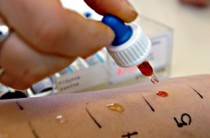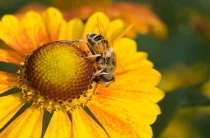Allergic diseases are the curse of modernity. Now it can be seen more and more often. Today - every fifth inhabitant of our planet. The constant introduction of new substances, which occurs with the development of the heavy, chemical and food industries, aggravates the situation.
Allergic conjunctivitis are symptoms that are characteristic of eye inflammation that is allergic in nature. Unlike ordinary conjunctivitis, the cause of the inflammatory processes of the mucous membranes of the eye is the effect of the allergen on the body of an allergic person.
And so, how does the development of symptoms of conjunctivitis with allergies occur? It all starts with the patient's immunity, which, for certain reasons, begins to produce antibodies to common substances that do not pose a threat to our health. The result is a provocation of the body, which develops symptoms characteristic of infectious lesions or the toxic effects of certain poisons. So, harmless pollen is perceived by an allergic person, more precisely, by his body as a harmful substance, as a result of which the entire spectrum of manifestations of conjunctivitis is manifested.
Symptoms of allergic conjunctivitis:
- Redness around the eyes;
- Decreased visual acuity;
- Constant itching in the eye area;
- Increased tearing;
- Vasodilation, severe irritation of the whites of the eyes;
- Increase in intraocular pressure;
These symptoms are not only a cosmetic inconvenience that violates the aesthetic appearance of the patient. With allergic conjunctivitis, the patient's usual rhythm of life is often disturbed. Its manifestations bring considerable inconvenience. For this reason, symptomatic therapy of this disease is very important for conjunctivitis.
Symptoms of allergic conjunctivitis are mainly manifested by contact with allergens that are airborne. Often, these are plant pollen, dust (or rather, microscopic mites that inhabit it), perfumes and cosmetics, cat hair, etc. With allergic conjunctivitis, symptoms of allergic rhinitis are often manifested, which consist in the fact that the patient experiences swelling of the mucous membranes of the nose, making it difficult to breathe, constant sneezing, secretion from the nasopharynx. These symptoms go hand in hand, but this is not always the case and this is not a general rule.
Allergy eye drops
Allergy eye drops are medications for relieving allergy symptoms that have a local effect. In general, given that the treatment of allergies is symptomatic. As such, there are no drugs that affect the cause of allergic reactions. Therefore, treatment is reduced to methods of a preventive nature, as well as the elimination of symptoms.
For the use of eye drops, it is necessary to distinguish between the symptoms of infectious and allergic conjunctivitis, since the treatment in this case is prescribed differently. Moreover, the vast majority of allergy eye drops for infectious conjunctivitis are contraindicated.
In addition to conjunctivitis, it is also necessary to take into account other eye diseases that the patient may have. Since they may be included in the list of contraindications for a given disease or disorder.
Allergy eye drops are just a remedy to eliminate unpleasant symptoms. If you can feel more or less comfortable without them, then it's better to do so. Since we are talking about drugs that have side effects depending on their type, as well as the duration of use.
How to use eye drops correctly?
- Washing your hands before using eye drops is a must. Try to use hypoallergenic soap, since the components that make up modern cosmetics contribute to increased eye sensitivity, which is undesirable in principle, and even more so in case of allergies.
- If the symptoms caught you in the open air, then firstly it is necessary to carry out the procedure in places where there is no wind, and after it, use glasses that will perform a barrier function.
- The use of anti-allergy drops should in no case cause irritation of the mucous membrane of the eye;
- All devices, as well as a container with drops, must be kept in sterile clean conditions. A contaminated vial, composition or work surface can very quickly provoke irritation or infection, which will also significantly aggravate the course of the underlying disease;
- Allergy drops should only be prescribed by your doctor. Often, the help of an ENT doctor or ophthalmologist is also necessary.
Varieties of eye drops for allergies
Antihistamine drops
Antihistamine drops (azelastine, opatanol) are antihistamines for local use. Antihistamines are substances that prevent the development of allergy symptoms by counteracting the effects of histamine. Histamine is a hormone in the human body with many functions. One of them is the development of allergic symptoms. This happens when the histamine released by allergens comes into contact with certain receptors. Histamine blockers are substances that act on these receptors as a kind of “stub”, preventing them from connecting to each other.
This scheme prevents the development of allergic symptoms. This is due to the fact that histamine is the main hormone that is involved in the development of allergic reactions. All other hormones and proteins: leukotreins, serotonin, etc. are just assistants for the reactions that histamine unfolds throughout the body.
Side effects:
- In some cases, after the procedure, it begins to bake in the eyes;
- migraine;
- dizziness and nausea;
- General weakness;
- Feeling of discomfort in the eye, as if foreign objects hit;
- Puffiness of the eyelids
As with other drugs, the risk increases with continued use. For this reason, antihistamine drops are not recommended for long-term use.
Corticosteroid eye drops
As with antihistamines, they are versions of systemic drugs adapted for topical use. Their main active ingredient is cortisol and its derivatives. These hormones are responsible for anti-inflammatory reactions, as well as relieve allergy symptoms. In addition, corticosteroids have an extremely impressive list of functions, but they are not considered in this context.
And so, as with any therapeutic form, whether it be tablets, ointments or injections, they are heavy artillery in the treatment of allergic disorders. Their use is justified only in case of severe manifestations of allergic symptoms. Glucocorticoids, in principle, are not used for a long time, since they are capable of cumulative action and extensive side effects.
The use of corticosteroid drugs - eye drops are not recommended for more than two weeks. Otherwise, it is recommended to constantly monitor the pressure inside the eye, which may increase. Self-treatment with glucocorticoid drops is of great danger. Unfortunately, they are available without a prescription and have a powerful anti-allergic effect, which encourages people to use them uncontrollably.
Vasoconstrictor eye drops
Redness of the eyes is due to the effect of histamine on the vessels inside the eye, which gives the command to increase pressure. As a result, there is tearing, increased sensitivity to bright light, as well as discomfort inside the eye. These symptoms are relieved with special drops, which, due to the stimulation of alpha-type adrenaline receptors, have a narrowing effect on blood vessels.
The most popular drug is Vizin, which is also often used to relieve symptoms of eye fatigue.
Allergy Prevention
And so, as we see, drops for relieving allergy symptoms are very serious drugs, with an impressive list of side effects . And don't be fooled by their availability, price, and constant TV and internet advertising that demonstrates carefree and frequent use. They are drugs that are suitable only for short-term use, as a means of neutralizing the acute manifestations of an allergic reaction.
The main thing that you can do, it is also the most useful thing is the prevention of allergic diseases. It comes down to certain measures that have a specification for allergic-conjunctivitis symptoms:
- Avoid walking in dry weather, as well as in windy weather, since most contact allergens spread easily under appropriate weather conditions;
- Avoid contact with the allergen as much as possible. No allergen - no allergy - this rule is universal for absolutely any allergic manifestations;
- Use methods to strengthen immunity: hardening, the use of vitamins, dosed physical activity;
- Talk to your doctor about immunotherapy, which can help you reduce or neutralize allergy symptoms for a while, depending on your individual characteristics.
We advise you to read:















